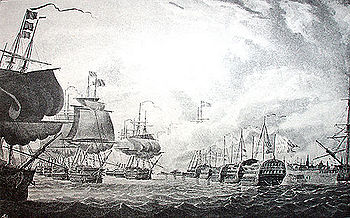- Orders in Council (1807)
-
The Orders in Council were a series of legislative decrees made by the United Kingdom in the course of the wars with Napoleonic France which instituted its policy of commercial warfare. Formally, an "Order in Council" is simply the type of legislation (in contrast to an Act of Parliament) by which the British government decreed these policies. However, especially in American history, the term "Orders in Council" is also used collectively to refer to the group of such decrees in the late-18th and early-19th centuries which restricted neutral trade and enforced a naval blockade of Napoleonic France and its allies. The Orders in Council are important for the role they played in shaping the British war effort against France, but they are also significant for the strained relations—and sometimes military conflict—they caused between the United Kingdom and neutral countries, whose trade was affected by them.
In Europe, restrictive British trade policy led to the formation of the Second League of Armed Neutrality, and deteriorating relations with other neutral powers, notably Denmark (with whom the British would fight a series of wars) and Russia. In the Atlantic, the Orders in Council were one of the main sources of tension between the United Kingdom and the United States which led to the War of 1812. In total, the collective "Orders in Council" refers to more than a dozen sets of blockade decrees in the years 1783, 1793, 1794, 1798, 1799, 1803-1809, 1811, and 1812; in practice, it is most often associated strictly with the decrees of January 7, 1807, November 11, 1807, and April 26 1809 which were most inflammatory to the Americans. The Order in Council of June 23, 1812, in a belated attempt at reconciliation with the Americans, repealed those three decrees, but, as the news was still crossing the ocean the United States declared war on the British two days later.
Contents
Background
By 1806, Napoleon was master of continental Europe effectively locking Great Britain out of the continent. However, the defeat of the French and Spanish navies at the Battle of Trafalgar (1805) ended any thoughts of an invasion of Great Britain. Napoleon, aware of British commercial strength, thus resorted to a policy of economic warfare, in what became known as the Continental System.
The Berlin Decree of 1806 forbade French, allied or neutral ships trading with Britain. By this means Napoleon hoped to destroy British trade, disrupt its growing industrial expansion and diminish its credit.
Great Britain responded with the Orders in Council of 1807 issued 11 November 1807 [1]. These forbade French trade with the United Kingdom, its allies, or neutrals, and instructed the Royal Navy to blockade French and allied ports.
Napoleon retaliated with the Milan Decree of 1807, which declared that all neutral shipping using British ports, or paying British tariffs, were to be regarded as British and seized.
Consequences
Due to the strength of the Royal Navy, the British blockade of continental Europe was reasonably effective. French trade suffered, and its primitive industrial revolution was set back. The United Kingdom, on the other hand, actually increased trade with its overseas colonies over the period. Smuggling persisted, and even Napoleon made exceptions to his embargo so he could procure necessary supplies for his war effort.
More significantly, enforcing the economic blockades led both the United Kingdom and France into a series of military engagements. The British bombarded Copenhagen in September 1807 (Battle of Copenhagen) to prevent the Danish joining the Continental System, and the British policy of stopping neutral ships trading with France played a large part in the outbreak of the Anglo-American War of 1812. However, it was Napoleon's invasion of Russia in the same year, again in part to enforce his continental system, that proved to be the turning point of the war. He was never able to recover militarily from that defeat.
The economic warfare ended with Napoleon's final defeat in 1815.
Repeal of the Orders in Council
The British made their greatest concession to the United States in June of 1812 just as the United States was declaring war. On June 16, 1812, two days before the United States declaration of war, Lord Castlereagh, the Secretary of State for Foreign Affairs announced in Parliament of the United Kingdom that the Order in Council would be suspended.[2]
On the very day that the Minister took his formal leave of the United States, June 23, 1812, a new British Government headed by Lord Liverpool provisionally repealed the Order in Council.[3]
Forty-one days after the United States Congress declared war, the word arrived in London on July 29, 1812. Two days later, July 31, 1812, the Ministry ordered its first counter-measures. It forbade English ships to sail except in convoys and restrained American ships in English ports. The Orders in Council had been repealed on June 23, 1812, but the ministers did not intend to take additional measures until they could learn the American reaction. Word of the repeal of the Orders did not reach President James Madison until August 12, 1812, some fifty days later. Even then he refused to halt hostilities because he did not know how Britain had reacted to the declaration of war. [4]
References
- ^ Holberg, Tom The Acts, Orders in Council, &c. of Great Britain (on Trade), 1793 - 1812
- ^ Hickey, Donald. The War of 1812. (pg. 42) ISBN 0-252-06059-8
- ^ Hitsman, J. The Incredible War of 1812. (pg. 48) ISBN 1-896941-13-3
- ^ Mahon, John. The War of 1812. (pg 35) ISBN 0-306-80429-8
Wikimedia Foundation. 2010.

